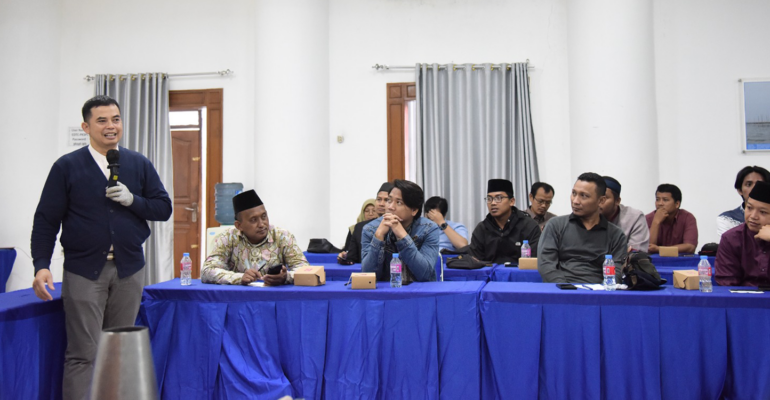Dr. drh. Supratikno, PA.Vet, a faculty member at the School of Veterinary Medicine and Biomedical Sciences (SVMBS) at IPB University and a researcher at the Halal Science Center (HSC) IPB University, emphasized the importance of applying the five principles of animal welfare during the sacrificial slaughter. These principles are: freedom from hunger and thirst, freedom from discomfort, freedom from pain, injury, and disease, freedom from fear and distress, and freedom to express normal behavior.
“These five principles are crucial to understand as they relate to the diverse handling of sacrificial animals. Furthermore, they determine the quality and halal status of the meat, ensuring it aligns with the core tenet of Islamic law, which is showing kind treatment (Ihsan in Arabic) to animals,” he stated.
Dr. Supratikno conveyed this information during a training session on the handling and slaughtering of sacrificial animals aimed for mosque welfare board members (DKM), sacrificial committee members, and the general public. This training was organized by the HSC IPB University in collaboration with the Food, Drug, and Cosmetic Assessment Institute (LPPOM) of the Indonesian Ulema Council (MUI).
Prof. Khaswar Syamsu, Head of HSC IPB University, remarked, “This training is a form of IPB University’s community service through socializing the proper sacrificial slaughter methods in accordance with Islamic law. We hope that participants will be able to apply their knowledge in their respective areas.”
Moreover, this outreach addresses the ongoing issues where many sacrificial slaughters do not yet meet Islamic law. It is common to find that the processes during and after the slaughter do not fulfill the aspects of benevolence towards animals (ihsan) and wholesome (tayib) aspects.
“We hope that this training will benefit slaughter practitioners, DKM members, and sacrificial committee members so that the knowledge gained can be applied when performing sacrificial worship in the community,” he added.
Ir. Muti Arintawati, Director General of LPPOM, officially opened the event. She noted that this annual collaboration with HSC IPB University is part of LPPOM’s mission to raise public awareness about the halal status of products. Furthermore, according to a 2022 HSC IPB University survey, the number of halal-certified slaughterhouses is still very low, below 15 percent.
“Through this outreach, we hope to increase the awareness of business actors and the community as users, to take an active role in providing knowledge, supervising the animal slaughter process in the community, and encouraging the acceleration of halal certification for slaughterhouses and poultry slaughterhouses (RPU),” she explained.
Drs. Aminudin Yakub, Director General of the Professional Certification Institute (LSP) MUI, also shared insights on delving into the aspects of Islamic Law and Fiqh in the Conduct of Sacrificial Worship. He explained that the primary requirement for sacrifice is showing benevolence (ihsan) towards the animal.
In addition, the sacrificial animal must meet animal health standards according to legislation. Another important point is that the slaughterer should not only understand but also be recommended to be a certified expert by the LSP.
“The skilled slaughterer needs to ensure the slaughtering process is done quickly and precisely to ensure the meat is halal and to confirm that the animal’s death is due to the slaughtering process, not other actions,” he explained.
Besides theory, the training participants also gained practical understanding through hands-on practice. Dr. Supratikno demonstrated various methods of cattle handling, proper slaughtering techniques for goats, and post-slaughter carcass handling. (MW/Rz)

